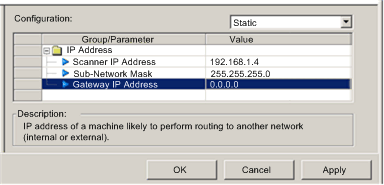-
select a Configuration mode, which specifies how the communication module obtains its IP addressing settings
— and —
-
edit the IP addressing settings that will be used if the Configuration mode is set to Static
The TCP/IP page looks like this:
To display this page, select the Channel Properties → TCP/IP node in the navigation tree located on the left side of the Device Editor.
Selecting a Configuration Mode
Use the Configuration list to specify a configuration mode. The configuration mode setting determines how the communication module obtains its IP address at startup. Choices are:
|
Configuration Mode
|
Description
|
|
Static
|
The module uses the scanner IP address, gateway IP address, and sub-network mask configured in this page.
|
Setting the Module Addresses in
Static Mode
Configure 3 IP addressing properties for the Ethernet communication module in Static configuration mode:
|
Property
|
Description
|
|
Scanner IP Address
|
The 32-bit identifier — consisting of both a network address and a host address — assigned to a device connected to a TCP/IP Internet network using the Internet Protocol (IP).
|
|
Sub-Network Mask
|
The 32-bit value used to hide (or mask) the network portion of the IP address and thereby reveal the host address of a device on a network using the IP protocol.
|
|
Gateway Address
|
The address of a device, if any, that serves as a gateway to the communication module.
|
Default Address Configurations
The communication module uses a default address configuration when it is not configured or when a duplicate IP address is detected. The default address is based on the MAC address of the module and makes it possible for several Schneider Electric devices to use their default network configuration on the same network.
The module uses the following default address configurations:
-
No router configured:
Service port (ETH 1) default IP = 10.10.MAC5.MAC6
Interlink port (ETH 2) default IP = 10.10.MAC5.MAC6
Control ports (ETH 3, 4 default IP = 10.10.MAC5.MAC6
-
Router configured, fieldbus network configured, service port configured for access mode:
Service port (ETH 1) default IP = 169.254.10.MAC6
Interlink port (ETH 2) default IP = 169.254.20.MAC6
Control ports (ETH 3, 4) default IP = 169.254.10.MAC6
-
Router configured, fieldbus network configured, service port configured for extended network:
Service port (ETH 1) default IP = 169.254.30.MAC6
Interlink port (ETH 2) default IP = 169.254.20.MAC6
Control ports (ETH 3, 4) default IP = 169.254.10.MAC6
Duplicate Address Checking
Before going online, the module sends out at least 4 messages with a proposed IP address:
NOTE: When powering up an entire network, some switches may be slow to complete the power up process. This can cause some ARP messages to be dropped. To help avoid this situation, Schneider Electric recommends that, when powering up an entire network, confirm that all network switches complete their power up cycle before powering up the PLCs.
